The Candidates
Not all states elect their Supreme Court justices, but we do here in Ohio. Terms for judges in Ohio last six years, including justices of the Supreme Court.
This fall, voters will elect three justices for the Ohio Supreme Court, a chief justice and two associate justices. Chief Justice O’Connor isn’t eligible to run again because she is over the age of 70, the mandatory retirement age.
Justices Brunner (D) and Kennedy (R) are both seeking to replace O’Connor as chief justice. For associate justice, incumbent Republican Pat DeWine is being challenged by Democratic Judge Marilyn Zayas; incumbent Republican Patrick F. Fischer is being challenged by Democratic Judge Terri Jamison.
In addition to donating dark money or public money, individuals and organizations show their support for candidates in other ways, including through endorsements that can add information and credibility to court candidates. For the first time, this year’s ballot will include the Supreme Court candidates’ party affiliations. All candidates have been officially endorsed by their state political parties, but each has additional support and recognition that can help voters make informed choices.
Below is a chart showing candidate ratings from the following organizations. This information was compiled by Judge4Yourself.com.
AABOA: Asian-American Bar Association
CCDLA: Cuyahoga Criminal Defense Lawyers Association
CMBA: Cleveland Metropolitan Bar Association
NSMBA: Norman S. Minor Bar Association
OPAA: Ohio Prosecuting Attorneys Association
OWBA: Ohio Women’s Bar Association
PD/cleveland.com: Plain Dealer
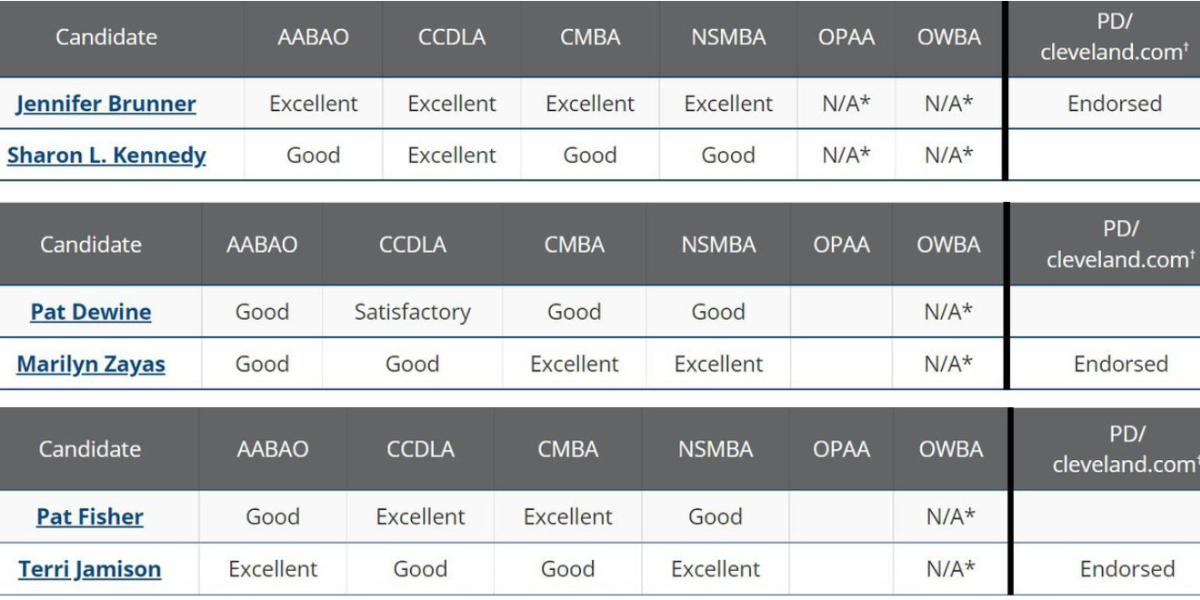
Below is a summary of the endorsements, support, and achievements of this year’s candidates. In alphabetical order:

Jennifer Brunner
Justice Brunner, a Democrat running for chief justice, has received endorsements from more than 30 labor unions, including Ohio AFL-CIO, United Auto Workers and United Food and Commercial Workers. The endorsements often bring PAC donations and communications to their members. In February, when the AFL-CIO endorsed Brunner, President Tim Burga said, “We know we can rely on her to enforce our constitution and state laws to ensure economic and social justice for all Ohioans.” The union has 1.1 million members and retirees. Her Facebook page announced plans to create an Ohio Task Force on Environmental Justice to prepare for legal issues and costs expected to arise from climate change. She credited a report by the Ohio Environmental Council with inspiring the task force.
Reproductive rights organizations supporting her include Planned Parenthood, Matriots PAC and #VOTEPROCHOICE—groups that trumpet their endorsements and communicate to growing memberships, often warning in real time that Ohio is promoting extreme anti-abortion policies.
Brunner has also been endorsed by The Plain Dealer, which stated that “Brunner’s experience in a range of courts, from trial to appellate levels, and her managerial experience, make her the best-qualified candidate to lead Ohio’s judiciary in a collegial, constructive manner.”
Brunner has signed the Ohio State Bar Association’s “clean campaign agreement,” agreeing to conduct her campaign in accordance with the pledge, and in line with the guidelines in Canon 4 of the Ohio Code of Judicial Conduct.
Website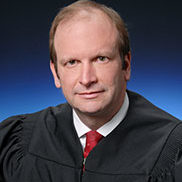
Patrick DeWine
Justice DeWine, a Republican, has been endorsed by leading business groups: Ohio Chamber of Commerce, Ohio Business Roundtable, Ohio Manufacturers’ Association, National Federation of Independent Businesses and the Ohio Farm Bureau. With at least one major Supreme Court case challenging the constitutionality of Ohio’s damage caps involving a child rape survivor, the business groups launched a campaign called Predictability Matters. It stresses the need for a consistent court that allows businesses to plan for the future, suggesting that uncertainty over the size of jury awards or environmental-related costs could hurt businesses’ bottom lines and cost jobs.
Despite the high-profile support from major business groups, DeWine does not list their endorsements on his re-election website. Instead, his campaign website includes just three endorsements: Buckeye Firearms Association which produces a Voter Guide, Cleveland Building & Construction Trades Council and Ohio Right to Life. The Fraternal Order of Police also endorsed DeWine but its support is trumpeted only on his Facebook page. The FOP endorsed all GOP court candidates and called them “friends of law enforcement.’’
DeWine has publicly criticized the court majority in DuBose v. McGuffey, a case that said that a defendant’s right to bail could be weighed against government interests, such as public safety. According to DeWine, the court ruling said the “safety of the community or victims of crime can never be a factor when a trial judge sets the amount of bail for an accused violent criminal.” Justice Dewine’s strident dissent in the Dubose case has given rise to a proposed constitutional amendment that voters will be asked to approve this November. The amendment seeks to increase the amounts of monetary bail that could be set for defendants, which runs contrary to recent bail reform efforts that seek to consider less restrictive means of securing a defendant’s appearance in court.
DeWine has declined to sign the Ohio State Bar Association’s “clean campaign agreement” this year. DeWine also declined to take part in The Plain Dealer’s endorsement interviews.
DeWine agreed in a judicial candidate survey that was conducted by Cincinnati Right to Life that the Constitution does not include the right to abortion. This led to an accusation from by pro-choice advocates and nonpartisan lawyers that the candidate lacks impartiality.
Website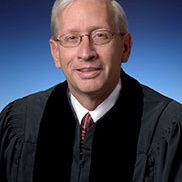
Patrick Fischer
Justice Fischer is a Republican who lists no endorsements on his campaign website, opting instead to highlight legal achievements: graduated with honors from Harvard Law School, routinely named to Ohio Super Lawyers, past President of the Ohio State Bar Association. He also lists personal achievements: he is an active member of St. Xavier Catholic Church where he serves as a Eucharistic Minister and a founding member of the Cincinnati Children’s Museum board.
Like the other Republicans running for the high court, Fisher has been endorsed by leading business groups: Ohio Chamber of Commerce, Ohio Business Roundtable, Ohio Manufacturers’ Association, National Federation of Independent Businesses and the Ohio Farm Bureau. His Facebook page touts an endorsement from the Fraternal Order of Police of Ohio and, Ohio Right to Life announced it has endorsed all three GOP Supreme Court candidates.
Fischer has declined to sign the Ohio State Bar Association’s “clean campaign agreement” this year. Fischer also declined to take part in The Plain Dealer’s endorsement interviews.
Fischer agreed in a judicial candidate survey that was conducted by Cincinnati Right to Life back in March that the Constitution does not include the right to abortion. This led to an accusation from by pro-choice advocates and nonpartisan lawyers that the candidate lacks impartiality.
Website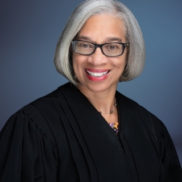
Terri Jamison
Judge Jamison is a Democrat who serves on the 10th District Court of Appeals. She is a woman of color with endorsements from top Ohio Black leaders such as U.S. Congresswomen Joyce Beatty and Shontel Brown and support from top Democrats including U.S. Senator Sherrod Brown and Congressman Tim Ryan who is Ohio Democrats’ nominee for an open U.S. Senate seat. Sen. Brown called her “a leader committed to making equal justice a reality for all Ohioans’’ and noted the unique perspective she brings that includes everything from her days working underground in coal mines to past work as a public defender.
More than a dozen unions have endorsed her, including the Ohio AFL-CIO, United Food and Commercial Workers and United Mine Workers. She also has support from Cleveland Stonewall Democrats, women’s groups and organizations promoting abortion rights such as Planned Parenthood Advocates of Ohio, Matriots PAC, #VOTEPROCHOICE and ReSisters of Central Ohio.
Jamison has signed the Ohio State Bar Association’s “clean campaign agreement,” agreeing to conduct her campaign in accordance with the pledge, and in line with the guidelines in Canon 4 of the Ohio Code of Judicial Conduct.
Website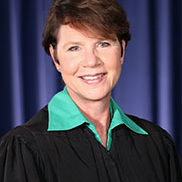
Sharon Kennedy
Justice Kennedy is a Republican seeking to win the open seat for chief justice. Like her fellow GOP court candidates, she has been endorsed by leading business groups: Ohio Chamber of Commerce, Ohio Business Roundtable, Ohio Manufacturers’ Association, National Federation of Independent Businesses and the Ohio Farm Bureau as part of their “Predictability Matters’’ campaign. Kennedy amplified the campaign on Facebook, writing, “Judges say what the law says, not what it should be. Predictability matters.’’
Kennedy often highlights her past work as a police officer and her campaign website also boasts support from 12 county Republican Party organizations, FOP Ohio and other labor unions that tend to favor Republicans. She also has support from several conservative groups including Ohio Value Voters, Conservative Republican Leadership Committee and Right to Life Coalition of Ohio. The Value Voters’ motto is “Protecting Faith, Family, Freedom and the Sanctity of Life.” It boasts that it has “nearly 1.5 million citizen voters and supporters.’’
Sharon Kennedy has declined to sign the Ohio State Bar Association’s “clean campaign agreement” this year. Kennedy also declined to take part in The Plain Dealer’s endorsement interviews.
Kennedy agreed in a judicial candidate survey that was conducted by Cincinnati Right to Life back in March that the Constitution does not include the right to abortion. This led to an accusation from by pro-choice advocates and nonpartisan lawyers that the candidate lacks impartiality.
Website
Marilyn Zayas
Judge Zayas is a Democrat who serves on the 1st District Court of Appeals. Her campaign website lists no endorsements, choosing to focus instead on legal achievements. She’s partnered with law enforcement on victims’ advocacy issues, won the 2017 Alumni Achievement Award from the University of Cincinnati College of Law, litigated in both state and federal courts and is the first Latina elected to an Ohio court of appeals.
She has a series of endorsements from groups that champion reproductive rights such as the Matriots and Planned Parenthood. The Matriots singled out her “unique background in internet technology’’ and said it helped shape her balanced and analytical approach to the law. Like the other Democrats running for the court, she has strong support from elected officials, including U.S. Sen. Sherrod Brown, and a collection of labor endorsements including Ohio AFL-CIO, United Food and Commercial Workers and Ohio Education Association. She announced the endorsements on Facebook.
Zayas has signed the Ohio State Bar Association’s “clean campaign agreement,” agreeing to conduct her campaign in accordance with the pledge, and in line with the guidelines in Canon 4 of the Ohio Code of Judicial Conduct.
WebsiteDigging Deeper

Where else can voters get information about the candidates?
The Ohio Supreme Court can defend or undermine our rights. Voters need to know whether a candidate has the essential qualities to be a good judge: integrity, knowledge of the law, and freedom from bias so that they can apply the law fairly. However, it isn’t easy to get to know judicial candidates. Unlike other candidates, judicial candidates cannot make promises to voters or say anything about how they would rule in cases that they might decide in the future. This fact contributes to the disproportionate impact that dark money can have in these elections.
You might be able to find out something about the judicial candidate through their own ads and the political ads running against them. But political ads are only a piece of the puzzle. Try to get to know the candidates. These resources can help:
- Judicialvotescount.org is a voter guide hosted by the Ohio State Bar Association where Ohio voters can read what candidates say about themselves.
- The Ohio State Bar Association will release ratings of judicial candidates closer to the November election. Lawyers and other judges are asked to rate their experiences with the candidates and vote on whether they should be recommended or not recommended. Some candidates are found to be highly recommended. These Bar ratings can be used to gauge prospective judges’ and justices’ ability to perform their jobs. [Click here to read their answers to questions from the non-partisan Ohio State Bar association.]
- Keep an eye on upcoming debates and forums. Soon, the Ohio Debate Commission is expected to announce upcoming judicial forums. This is an opportunity to hear directly from the candidates for the Ohio Supreme Court.
- There may also be judicial forums you can attend where you can ask the candidates questions. The League of Women Voters published this list of useful (and permissible) questions to ask judicial candidates.
- Learn more about the candidates from the non-partisan website OHSC2022.info.
- Follow the candidates on social media; google their names to find news articles and more; read their judicial opinions.
- Examine what organizations have endorsed each candidate.
- Take a look at who has made campaign contributions on the Ohio Secretary of State’s website.
